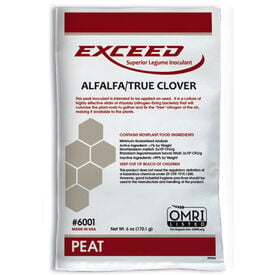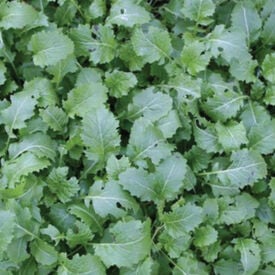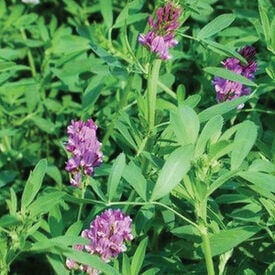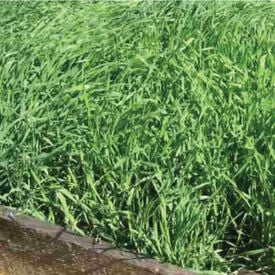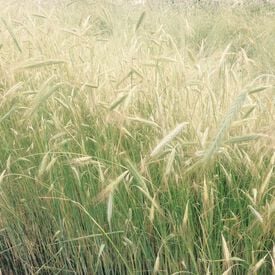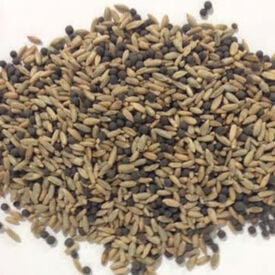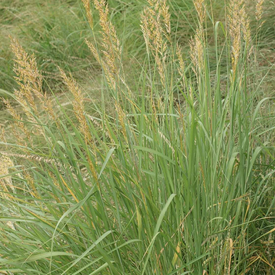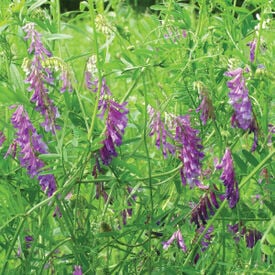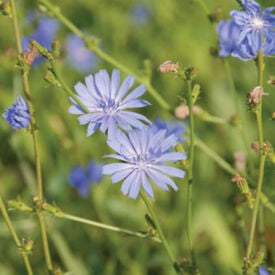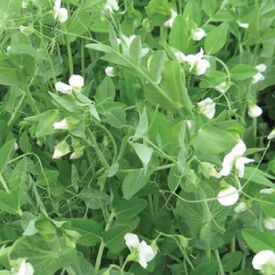Inoculants help free nitrogen from the air and into a usable form for plants. Seed Inoculants are able to convert and use this "free" nitrogen from the air into a usable form for the plant. This natural process gives your garden legumes the ability to provide their own organic fertilizer. Resulting in a more bountiful yield. Naturally. Natural, dry, peat-based cultures of beneficial bacteria. 6 ounces treats up to 50 lbs. of alfalfa and clover seed. OMRI/Organic.
Dwarf Essex Rape (Brassica napus) is a fast-growing, cold-hardy forage crop commonly used for livestock grazing, wildlife food plots, and soil improvement. This leafy brassica produces high-protein, highly digestible forage that remains palatable even in colder temperatures, making it an excellent choice for fall and winter grazing. It is drought-resistant and can thrive in various soil types, providing a nutritious food source for deer, cattle, and other grazing animals. Additionally, its deep root system helps improve soil structure and reduce erosion. Due to its rapid regrowth, Dwarf Essex Rape is a valuable option for sustainable pasture management.
The Common Alfalfa is a somewhat winter hardy perennial legume, but it grows more quickly than other regular alfalfa varieties. As an annual green manure, this cool-season "Summer" alfalfa can produce up to 10 tons of organic matter per acre. Its long taproots break up compacted soil and bring up subsurface minerals. High nitrogen fixation and great bee forage. Alfalfa is basically good at everything, as it great for nitrogen fixation and bee forage! Just look at all it's uses below! Alfalfa (Medicago sativa L.): Cool season, broadleaf, Perennial, Legume (N-fixation), Upright plant growth, Crude protein: hay or silage 14-22% Uses: Bees & Beneficial Insects, Chicken Forage, Compaction Control, Deer Attractant, Erosion Control, Forage, Green Manure, Nitrogen Fixation, Nitrogen Scavenger, No Till, Organic Matter (Biomass), Weed Suppression
Iron and Clay cowpeas makes a great cover crop for smothering weeds and adding Nitrogen to soil. This variety of cowpeas are grown just like soybeans. Iron and Clay is a fast growing plant that can reach 3'. The best time to plant is during spring for best results as the frost will kill the cowpeas. Iron and Clay has long taproots that help withstand drought conditions and can produce as much as 300 lb./acre nitrogen. This variety has a high organic matter production. Broadcast up to 120 lb./acre, 1/2 to 1" deep. Try with cowpea inoculant for maximum Nitrogen fixation.
The Elbon Rye is a grain that is the best choice for fast, cool-season germination that prevents erosion and builds organic matter in the soil! Plant this variety early to late fall; in mild climates fall through early spring. This grain captures soil nutrients in the fall to release in spring when worked into the soil. The Elbon Rye can reach up to 5 feet! Cereal Rye (Secale cereale L.): Cool season, grass, Annual or perennial, Upright plant growth, Crude protein: straw 4%, grain 14%, C:N ratio: 40-48, Self pollinator (wind) Uses: Erosion Control, Green Manure, Nitrogen Scavenger, No Till, Organic Matter (Biomass), Weed suppression
The Winter Rye is a tall grain cover crop that can reach up to be 5 feet tall and prevents erosion and builds organic matter in the soil. This grain can be planted early to late fall and in mild climates, fall through early spring. This grain is the best choice for fast, cool-season germination. The Winter Rye captures soil nutrients in the fall to release in spring when worked into the soil. Uses: Erosion Control, Green Manure, Nitrogen Scavenger, No Till, Organic Matter (Biomass), Weed suppression
The California Blackeye #46 is similar to California Blackeye #5, but with smaller seeds. Bred by the UCLA and released in 1987. California Blackeye #46 plants are more erect than California Blackeye #5. The seeds are a typical blackeye type of Southern peas with cream-colored seed coats and black pigments around the eyes. Heavy yielder. If using for Nitrogen fixation we highly recommend using a cowpea inoculant. Try with cowpea inoculant for maximum Nitrogen fixation.
Great way to fix nitrogen and add organic matter to the soil! A great mix of grass and legume cover crops. Hairy Vetch works well for nitrogen fixation while Rye adds organic matter and protects the less hardy vetch from winter damage. If planted in fall it comes back early spring with heavy growth. Cut right after it flowers and spring and till into soil. (75% Winter Rye / 25% Hairy Vetch) Seed Coverage: - 5 lbs covers 2,000-4,000 sqaure feet - 100 lbs covers 1-2 acres Uses: Deer Attractant, Green Manure, Nitrogen Fixation, No Till, Organic Matter (Biomass), Weed Suppression
The Indiangrass is a warm-season bunchgrass that is native to central and eastern North America and provides cover and food for wildlife. This grass can reach up to seven feet tall and is a common species of the Tallgrass Prairie. The beautiful, plume-like seed heads are very ornamental making them excellent for prairie and conservation mixtures.
When sown late summer, the Hairy Vetch spring regrowth is vigorous and nitrogen-producing, for tilling in before planting spring garden crops. You can sow with or without grain, grass or field peas! The typical nitrogen produced of this legume is 100 lbs. per acre. The Hairy Vetch has rapid growth that makes it a good weed suppressant. Uses: Bees & Beneficial Insects, Chicken Forage, Deer Attractant, Erosion Control, Forage, Green Manure, Nitrogen Fixation, No Till, Weed Suppression
Chicory has a long taproot that penetrates subsoils which makes it drought tolerant and allows it to make minerals more available to livestock. Rich in potassium, sulfur, calcium, zinc, sodium, manganese and iron. When managed properly, Chicory produces leafy growth which is higher in nutritive and mineral content than alfalfa and other cool season grasses. Used mainly in mixes with other pasture or cover crop seeds. Chicory (Cichorium intybus L.) - Warm season, broadleaf - Perennial - Upright and spreading growth habit - Protein levels: 10-32% - Forms arbuscular mycorrhizal associations Uses: - Bees & Beneficial Insects - Chicken Forage - Deer Attractant - Forage
The Austrian Winter Pea, sometimes called black pea or field pea, is a great cool season legume for cover crops, wildlife and winter grazing! This cool-season, annual legume has good, nitrogen-fixing capabilities. The Austrian Winter Pea is a low-growing, viny legume which has been shown to fix over 200 pounds of nitrogen per acre per year. It has hollow, slender and succulent stems, 2 to 4 feet long. The foliage is pale green, and the flowers are colored, usually purple, pink or reddish. Uses: Chicken forage, deer attractant, forage, green manure, nitrogen fixation, no till, organic matter (biomass), weed suppression
